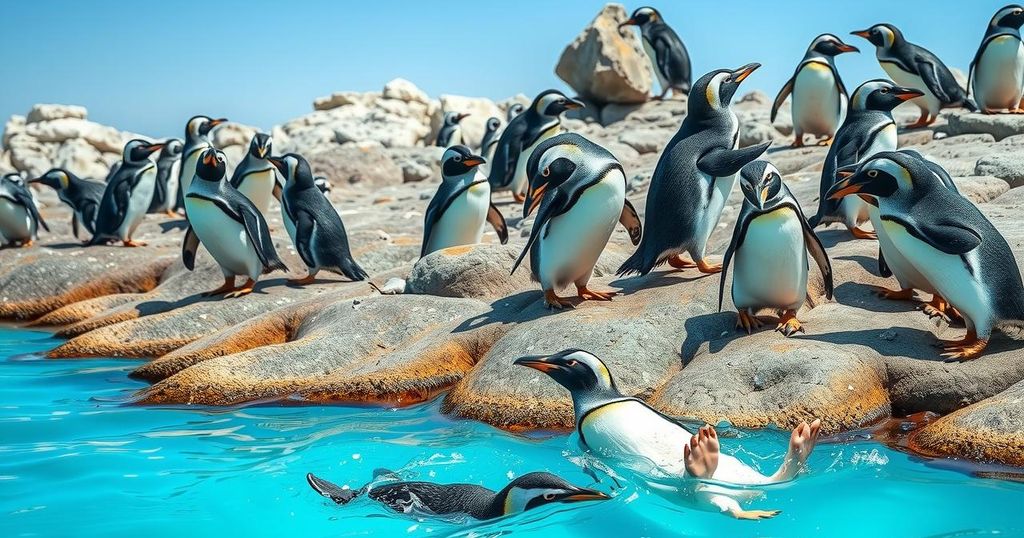Economic Value of South Africa’s African Penguins: A Call for Conservation
The African Penguin in South Africa carries an estimated economic value between R2-billion to R4.5-billion, with significant implications for tourism and job creation. While the pelagic fishing industry argues against expanded no-fishing zones, studies reveal that protecting penguin colonies can bolster both the economy and ecological balance. Conservation efforts require more comprehensive approaches beyond island closures, as the penguin population continues to decline due to human impacts and climate change.
The debate surrounding the conservation of South Africa’s critically endangered African Penguins often centers on the perceived conflict between environmental protection and economic interests. The pelagic fishing industry argues against proposed no-fishing zones, citing that it generates 5,100 jobs and contributes R5.5-billion to the economy annually. However, a report by Anchor Environmental Consultants establishes that South Africa’s penguin colonies carry an estimated value of R2-billion to R4.5-billion in 2023, and directly support up to 4,611 jobs.
This valuation encompasses various aspects such as tourism, property benefits, educational opportunities, and the inherent value individuals associate with the existence of the species. Researchers analyzed trends in tourist revenue in the Western Cape, particularly focusing on the Simon’s Town penguin colony over the past 25 years. They also gathered local perceptions of the penguins’ worth alongside comprehensive web-based surveys.
In October 2022, the African Penguin was designated as critically endangered, with projections indicating potential extinction within a decade without significant intervention. The report further underscores that the loss of this species carries substantial reputational risks for South Africa, affecting its image as a steward of the environment and its natural resources.
Furthermore, the authors advocate that conservation efforts must extend beyond merely declaring no-fishing zones. They emphasize the necessity of a comprehensive approach to ocean health management to avert ecological repercussions tied to penguin extinction. The report also notes that penguin tourism is still chiefly concentrated around two colonies in the Western Cape, with Simon’s Town contributing most to regional tourism.
Visitor numbers to the Simon’s Town colony have surged, demonstrating the growing significance of penguins to tourism economics. It is now one of the prime attractions in Cape Town, suggesting a burgeoning opportunity for growth in this sector. The report highlights the importance of penguin conservation as South Africa emerges as a global tourism destination.
Historically, the African Penguin population has dramatically declined from approximately 300,000 in the 1950s to merely 8,324 breeding pairs in recent years, primarily due to human-induced factors such as oil spills and competition for food resources caused by the fishing industry. Climate change has exacerbated these challenges, affecting the availability of vital prey species.
Despite measures introduced in 2008 to create no-fishing zones, the decline has persisted, particularly in the Eastern Cape, necessitating additional conservation strategies. Recently, seabird conservation organizations have pursued legal action to enhance these no-take zones, advocating for improved management tailored to individual islands rather than a blanket national approach.
In conclusion, the discussions and findings highlight the intrinsic economic value of penguins to South Africa. Effective conservation measures are essential, not only for protecting an endangered species but also for safeguarding the country’s reputation and bolstering its tourism industry. As the plight of the African Penguin unfolds, the need for a balanced approach recognizes both ecological and economic implications.
The African Penguin is an invaluable asset to South Africa, contributing significantly to the economy through tourism and ecology. While the pelagic fishing industry warns of economic losses from conservation measures, studies indicate that protecting penguin colonies offers greater long-term economic and environmental benefits. Effective strategies combining habitat protection and sustainable fishing practices are imperative to ensure both the species’ survival and the financial health of the region. As South Africa’s reputation as an eco-friendly destination is at stake, immediate action and collaborative effort are vital in addressing the challenges faced by African Penguins.
Original Source: groundup.org.za




Post Comment